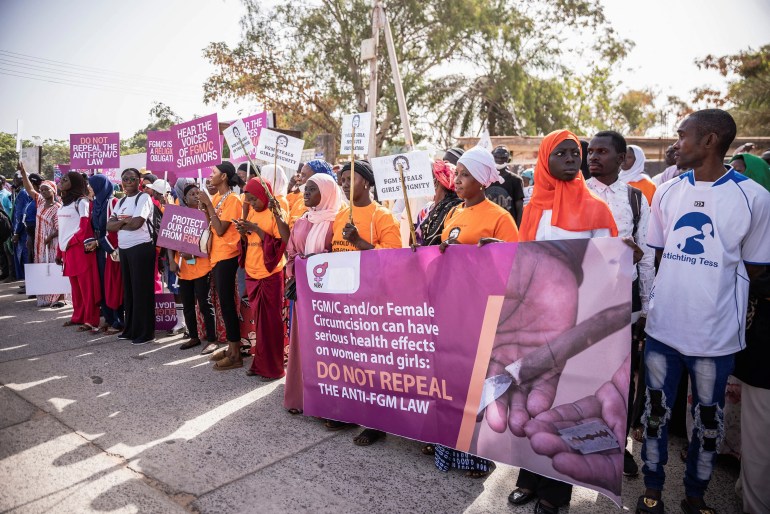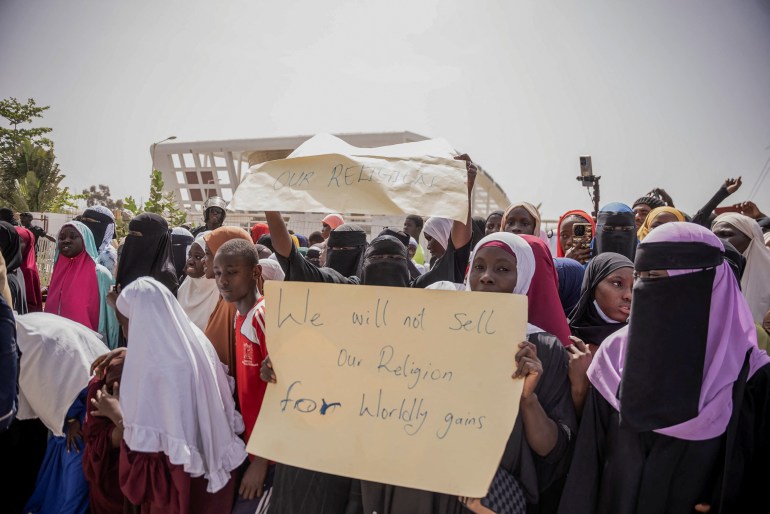[
*Names modified to guard confidentiality.
Banjul, Gambia – Fatou* was barely a 12 months previous when she was subjected to feminine circumcision, a apply also referred to as feminine genital mutilation, which rights teams condemn as abuse.
At the moment the 29-year-old lady from Bundung, a city on the outskirts of Gambia's capital Banjul, says she’s going to save her daughter from the identical destiny that haunted her, as parliament strikes to elevate the ban on FGM.
sitting in her kitchen making ready SuhoorAt a morning meal earlier than the start of the day of fasting within the Muslim month of Ramadan, Fatou shared her story of the ache and lasting trauma brought on by FGM.
“Once I bought married, my husband and I needed to face days of agony,” she stated, her phrases heavy with the burden of recollections. “We couldn’t consummate our marriage as a result of I used to be sealed.”
This was simply part of the struggling in his life. Finally she grew to become pregnant, however then confronted nice issue in giving delivery to her nine-month-old little one.
Standing firmly by Fatou's aspect, her husband is a beacon of assist, echoing his spouse's dedication to interrupt the cycle of struggling. However not all ladies are so fortunate.
Sarta*, 35, is the mom of two daughters – a three-year-old and a 15-month-old. Childbirth was additionally a painful expertise due to his circumcision. Seeing the ache she was going by means of, her husband raised a vocal voice in opposition to FGM.
However when Sarta was pregnant together with her second little one in 2022, her husband tragically died in a street accident, leaving her to care for her daughters and combat for his or her future.
In a makeshift store she runs in Brufut, a village within the West Coast area, 23 km from Banjul, Sarata talked in regards to the lasting penalties FGM has had on her life.
“What do they need?” he requested, his voice shaking with ache. “The boys, the supporters of this barbaric apply, what do they need to obtain?” She continued, her youngsters had been taking part in close to the detergent, brooms and previous gadgets she displayed.
“I misplaced my husband, however not his resolve in opposition to FGM. We’ve got sworn to guard our women, but when the ban is lifted…” Her voice faltered earlier than rising with new power. “Will I allow them to undergo over my lifeless physique the best way I suffered?”

defend women' rights
In 2015, the Gambian Parliament took the historic step of passing the Girls (Modification) Act 2015, which criminalized FGM and made it punishable by as much as three years in jail – a major change after years of advocacy.
However most lately, on March 18, politicians voted 42 to 4 to place ahead a controversial new invoice that will repeal the historic FGM ban if handed after additional session and knowledgeable opinion from particular authorities ministries. Will give.
Almameh Gibba, the lawmaker who launched the invoice, argued that the ban violated the rights of residents to apply their tradition and faith. “This invoice seeks to protect non secular integrity and defend cultural norms and values,” he stated.
Nevertheless, rights organizations say the proposed regulation reverses years of progress and dangers damaging the nation's human rights report.
“We fully and with out hesitation oppose the apply of any type of FGM,” stated Jama Jack, co-founder of Assume Younger Girls (TYW), a number one women-led non-profit group.
For greater than a decade, TYW has engaged communities, supported sensitization efforts, and empowered youth advocates to fight FGM – even after the regulation was handed in 2015.
The NGO sees the proposal to repeal the regulation as a betrayal of girls and women.
Jack stated, “Repealing the regulation would have uncovered all these women to the true threat of being betrayed, taken to cutters, mutilated after which left to take care of the implications for his or her bodily and psychological well being Is.”
“Making certain that the regulation banning FGM stays in place will ship a robust sign that the Authorities of The Gambia is dedicated to its responsibility to guard all residents and won’t put the pursuits of some over the security of the bulk.”

Tabou Njie Saar is one other passionate advocate for preserving the FGM ban. As ladies's rights supervisor on the NGO Motion Assist, she campaigns in opposition to repealing the regulation – emphasizing its very important function in defending ladies and women from dangerous conventional practices and human rights violations. She was amongst a whole lot of girls gathered within the Nationwide Meeting when the Girls's Modification Invoice was launched.
“By sustaining the ban, The Gambia is fulfilling its obligations in direction of the rights of girls and women,” she stated, drawing consideration to the nation's commitments to worldwide conventions defending ladies's rights.
Sarr highlighted the dangers posed by FGM, together with dangerous results on sexual and reproductive well being and the chance of irreparable hurt brought on by untrained circumcisers.
For Sarr, schooling is paramount in combating FGM. She advocates for widespread consciousness campaigns and stresses the necessity to additionally educate males – who typically have decision-making energy in households – in regards to the critical penalties of FGM.
Sarr lamented the lack of awareness amongst some individuals, together with members of the Nationwide Meeting, who assist repealing the FGM regulation as a consequence of ignorance of its dangerous results.
Lamine Cisse, a member of the Nationwide Meeting representing the constituency the place FGM is prevalent, is amongst these advocating for repeal of the ban, citing non secular and constitutional grounds.
When questioned as to why anybody ought to prioritize faith over the lived experiences of the numerous ladies affected by FGM, Ceesay insisted on proof and knowledge to again up his claims that the apply is dangerous. “We want knowledge to search out out what impression this has on them,” he stated.
secretly fgm
The Gambia's Ministry of Gender, Kids and Social Welfare issued a press assertion highlighting the nation's progress in combating FGM for the reason that Nineteen Eighties.
Though the federal government helps the ban, it has stated it can permit non-public members' payments to comply with correct parliamentary process as a part of the federal government's adherence to democratic ideas and the rule of regulation.
But, regardless of efforts to cease the apply, FGM nonetheless impacts 73 % of girls aged 15-49 within the nation, underscoring the persevering with challenges.

Even after the 2015 regulation got here into impact, the apply continues in secret, inflicting harmless victims like 34-year-old Sarjo* and her four-year-old daughter to undergo in silence.
Sarjo, a single mom from Brikama, one of many largest cities in Gambia, made a solemn promise to guard her daughter from such horrors throughout childbirth, and refused to topic her to this apply.
Tragically, their belief was betrayed when their daughter grew to become a sufferer of FGM with out their consent. It occurred final 12 months, when Sarjo left her daughter with the kid's father's household and her grandmother organized for her to be circumcised.
When Sarzo learns what occurred the ache and betrayal nonetheless haunts him.
“My little lady was advised to not inform me or anybody (what occurred), so she didn't. I got here to know when he bought the an infection,” she stated in a trembling voice.
Sarjo went to a number of police stations to report the matter however she stated they didn’t take her case significantly. As soon as once more, he felt betrayed – this time by those that had been entrusted with the accountability of upholding justice.
When the vote happened to repeal the FGM ban, Sarjo was among the many ladies protesting exterior parliament. She additionally speaks to different moms and educates them about not subjecting their daughters to this dangerous apply.
But, amidst the defiance, there are vocal voices intent on retaining the apply alive.
assist regardless of ban
Final August, three ladies had been fined for circumcising eight new child women – the primary ladies to be convicted underneath the anti-FGM regulation.
In a controversial transfer in September, the distinguished Gambian Islamic chief, Imam Abdoulie Fatty, made headlines by paying a fantastic of 15,000 dalasi ($220) for every of the three convicted ladies.
Regardless of the ban, ladies together with circumciser MBA Yassine Fatty had the operation carried out in Niani Bakadagi, an FGM-prevalent village within the nation's Center River area.

Imam Fatty's assist for FGM – as demonstrated by his standing with convicted ladies – brought about outrage amongst ladies's rights advocates and anti-FGM campaigners.
In a video extensively shared on social media, he additionally introduced his intention to proceed advocating for FGM, whereas difficult authorities to intervene.
Regardless of legislative efforts to criminalize the apply and impose fines, Imam Fatty stays steadfast in his stance contemplating it an integral a part of Islamic custom.
Their actions have reignited debate over FGM, highlighting the continuing battle to finish the apply regardless of authorized restrictions.
The way forward for Gambian ladies
Following the vote on 18 March, the invoice searching for to overturn the FGM ban was referred to a parliamentary committee for additional scrutiny.
Within the committee stage, stakeholders shall be engaged, public enter shall be collected, and knowledgeable opinion shall be sought from ministries together with the Ministry of Gender, Ministry of Well being, and Ministry of Justice. The regulation will then be amended and put to a second vote – a course of that might final weeks or months.
In the meantime, the way forward for Gambian ladies and women hangs within the steadiness.
The Gambia Bar Affiliation (GBA) has strongly opposed the proposed repeal of the 2015 regulation. Based on the GBA, repealing the regulation would weaken the nation's dedication to defending the rights of women and girls and violate worldwide and regional human rights treaties.
The GBA urged the Inspector Basic of Police to implement it strictly, saying, “This regulation will stay in power till it’s repealed and therefore should be adopted.”
Nevertheless, rights activists and plenty of survivors of this apply are involved.
At her residence in Bundung, Fatou checked out her nine-month-old child, seeing a future stuffed with hope and risk, however one that will now be at better threat.
“I dream of a world the place my daughter can develop up with out worry,” she whispered, her fingers tracing the define of her daughter's small hand.
Sarata additionally shares comparable fears. She sees the prospect of the regulation being repealed as a looming nightmare that casts a darkish cloud over the way forward for Gambian women.
To her daughters taking part in subsequent to her, each chortle and smile is a testomony to the hope flickering inside them, and a reminder of why Sarta is preventing to maintain the ban in place: “They’re my coronary heart, my soul. Are,” he stated.

